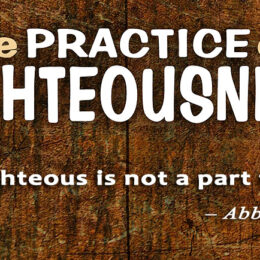 by Anthony Esolen –
by Anthony Esolen –
Some years ago, in Defending Marriage: Twelve Arguments for Sanity, I wrote, as the ninth argument, that “to celebrate an abnormal behavior makes things worse, not better, for those inclined to engage in it.” I believe that that statement, right now, would be quite uncontroversial in any other area of human choice but the sexual; though it is precisely the sexual that illustrates its truth most clearly, as we see in our midst, so obviously that only our own moral compromises, or a kind of ideological idolatry, can prevent us from telling ourselves what we do see.
For back in 2014, those halcyon days at what most people thought was the floor of a crater below which we could not continue to fall, no one thought that drag queens in see-through garb would be encouraging little children in public libraries to stick dollar bills in their underwear, or that a photo of a little Dutch girl surrounded by “bondage” men in black leather underwear would win an award for being “iconic” and “inclusive.”
Try, dear reader who may still be unwilling to follow a premise to its conclusion, try to imagine uttering the previous sentence to any but the most depraved human being on earth, anywhere, in 2010, or 2000, or, dear Lord, in 1990, when, if we are to judge by the mad accusations madmen make against the few remaining people in the West who do not parade along with the madness, the world was peopled by “theocrats” and knuckle-dragging, right-wing, snake-handling fundamentalist Christians, rather than ordinary people with some residual sense of shame and some guilty reservations about the sick world into which they were sending their children.
There is a good reason why things get worse and not better for them who celebrate the abnormal. It is, as I wrote, that “what compels is not merely the object, but the very wrongness of the object. Mere garden sins bring boredom. We must rouse the spirit to more and more outrageous wrongs.” Homosexuals themselves, I said, “admit that they delight in being ‘transgressive,’ crossing the boundaries of what is decent or even mentionable. It follows that the nature of the transgressing behavior will depend upon where the society draws the line.”
Where is that line now? Oh, I hear, people will never go so far as to invite children into their sexual lives, by action rather than celebration. Do not believe it. It is a short step from seeing to touching. The very publicity of it will lend it some cover. And man, ever inventive in the illogic of evil, will find some way to distinguish a “good” kind of pederasty, the kind we see putting forth buds right in our midst, from the “bad” kind, the kind for which the Church’s coffers were—justly—rifled.
Sins of intemperance still respect the created order, the order of nature. Wine does gladden the heart, though a man may drink too much of it, or in the wrong place, or at the wrong time. But in sins aimed precisely against the created order, we direct our strengthless swords against the very heart of God, and the more we fail, the more furiously we go on the attack.
You do not have to take my word for it though. Human history abounds in examples. Take St. Paul’s word for it. “Claiming to be wise,” he says of fallen man ever-falling, “they became fools, and exchanged the glory of the immortal God for images resembling mortal man or birds or animals or reptiles,” and “for this reason God gave them up to dishonorable passions. Their women exchanged natural relations for unnatural, and the men likewise gave up natural relations with women and were consumed with passion for one another, men committing shameless acts with men and receiving in their own persons the due penalty for their error” (Romans 1:22, 26-27).
We are touching upon what an old colleague of mine, Rene Fortin, called “negative transcendence,” an attempt to imitate God in an inverted way, hungering for evil upon evil, and setting the will up as a creator unto itself. “Whilst they adore me on the throne of hell,” says Milton’s Satan, when he is alone and the devils he deceived cannot hear him,
With diadem and scepter high advanced,
The lower still I fall, only supreme
In misery: such joy ambition finds.
The crater of evil has, of itself, no floor because of itself it is no thing at all, it is an anti-creative turn toward nonexistence, masking itself as creativity and life; and Hell itself may be the lowest plain below which the merciful God will not permit His creature to fall.
Is it then an accident of history that just at this time we find people eagerly awaiting the day when man will become “transhuman,” collapsing beneath the human, to enmesh himself in the toils and traces of the machine? It is as if, to use David Hart’s apt jest, when these wild-eyed worshipers of technology were little boys, they dreamed of someday growing up to be robots.
Or is it an accident of history that just at this time, hardly hidden at all beneath the desperate hope that “climate change” will render all the old modes of human life impossible, we find a self-righteous hatred of man, a wish, without Jonathan Swift’s satirical irony, that there would be far fewer of “the most pernicious race of little odious vermin that Nature ever suffered to crawl upon the surface of the earth”?
Another accident of history, that some women, again without the slightest sense of irony, should splash themselves in garish red paint for blood, to protest against any retrenchment of their legal permission to splash their bodies and the sanitary towels and the stainless-steel forceps and clippers of the operating room with the real blood of their own children?
Still another accident, that no nation in the cratering West can now replace the dying with the newly alive? That the richest of our urban neighborhoods should resemble Hell in this most significant respect, that people keep as far away from one another as possible, with fewer and fewer inhabitants per household, less and less likely to be married to a human being and more and more likely to be wedded or welded to a job, and a job, at that, less and less likely to promote or protect anything necessary or desirable for the common good?
Hell is a lonely place. And man, for whom it is not good to be alone, seeks to assuage his loneliness not by getting up and saying, “I will arise and go to my Father” (Luke 15:18), but by confirming the very evil that has made him lonely in the first place.
But it does not work. The drink does not satisfy, the drug no longer gives the thrill, mere nudity is dull, the first slimy dandling of the unnatural feels commonplace and “natural,” building a brutalist church seems but dry and unimaginative, the unspeakable obscenity now means little more than an ordinary adverbial intensifier, and the throne of Hell is not so glorious after all.
We have been made by God, for God, in His image, and that is why, as St. Augustine says, “Our hearts will never rest until they rest in Thee.” The alternative to the restlessness of those who seek God is the restlessness of those who reject God, pitched into a fury of restlessness because they wish to be gods unto themselves, and it is all in vain.
—————————————————
HT: Crisis Magazine. (Minor organizational edits and bolding of key phrases done by blog editors done to enhance readability.)

Photo by Bret Kavanaugh on Unsplash




Words escape me. You are so right. May Our Lord Have Mercy!